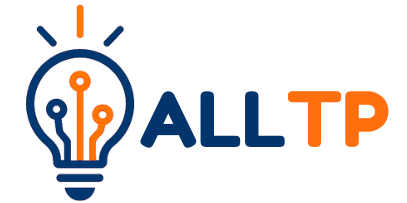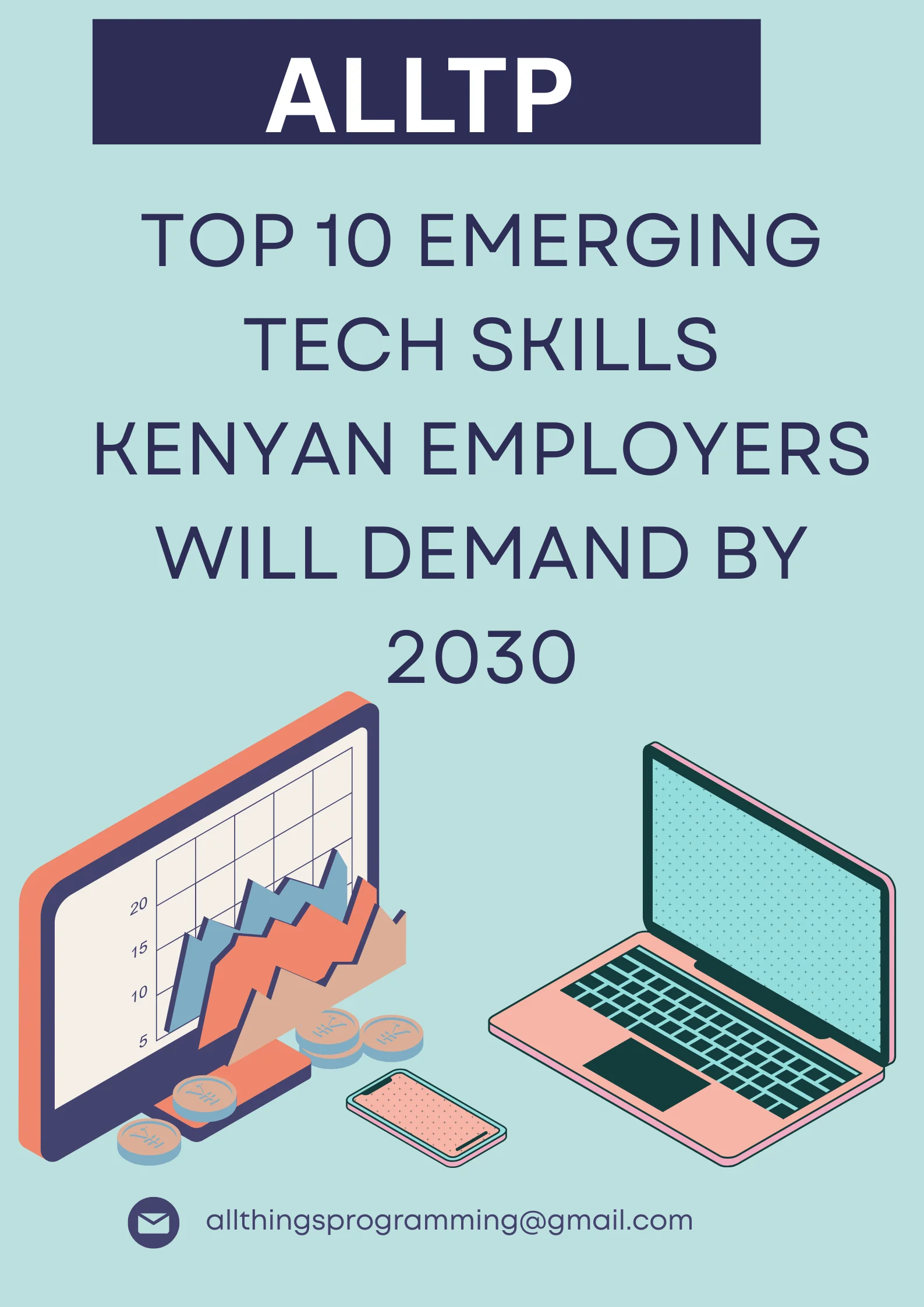Kenya’s technology landscape is evolving rapidly, powered by digital transformation, automation, and artificial intelligence (AI). As global industries adopt smarter, data-driven systems, the demand for advanced digital skills is accelerating, not just in developed economies, but across Africa’s emerging markets as well.
Within Kenya, the rise of the Silicon Savannah, strong mobile connectivity, and government investment in ICT have positioned the nation as a regional innovation hub. Sectors such as fintech, agritech, healthtech, and renewable energy are reshaping Kenya’s economy, creating new opportunities for digitally skilled talent.
In this transformation, EdTech platforms like All Things Programming are playing a vital role by offering hands-on digital learning experiences that prepare both students and professionals for the future of work. Their coding workshops, bootcamps, and project-based training align directly with the competencies employers will seek by 2030.
Forecasting which tech skills will be most in demand is therefore essential. For students, educators, employers, and policymakers, understanding these trends will guide smarter decisions in education, training, and workforce development. This article explores the top 10 emerging tech skills Kenyan employers will demand by 2030 and how platforms like All Things Programming are helping bridge the nation’s digital skills gap.
Basis for Prediction
The predictions in this article draw from both global technology trends and Kenya’s local economic context. Globally, the rapid growth of artificial intelligence (AI), data analytics, cloud computing, and automation is redefining industries and creating new categories of employment.
In Kenya, similar momentum is evident across fintech, agritech, healthtech, logistics, and renewable energy, sectors that are integrating digital tools to enhance productivity and efficiency. The government’s continued investment in ICT infrastructure, digital literacy programs, and innovation hubs further strengthens the foundation for a tech-driven economy.
Insights were also drawn from employer surveys, digital job postings, and workforce reports that highlight rising demand for specialized technical and data-oriented skills.
Together, these global and local indicators point to the technologies and skill sets most likely to shape Kenya’s employment landscape by 2030.
Top 10 Emerging Tech Skills Kenyan Employers Will Demand by 2030
1. Artificial Intelligence (AI) & Machine Learning (ML)
What it is:
AI and ML involve creating systems that can learn, reason, and make predictions from data without being explicitly programmed.
Why demand will increase:
AI is becoming central to how businesses make decisions, automate services, and enhance customer experiences. Kenya’s AI Strategy (2025–2030) envisions integrating AI across key sectors such as healthcare, agriculture, education, and finance.
Applications in Kenya:
- Chatbots for customer service in fintech and telecom.
- AI-driven crop disease prediction in agritech.
- Smart traffic management in urban transport.
- Fraud detection in banking and mobile money.
Current gap & upskilling:
Few local professionals specialize in AI model development and data ethics. Upskilling will require training in Python, TensorFlow, PyTorch, data modeling, and applied AI ethics through platforms such as All Things Programming, Zindi, or AI Kenya community programs.
2. Data Science & Analytics
What it is:
Data science uses statistical, programming, and analytical skills to extract insights from data for decision-making.
Why demand will increase:
As organizations digitize, data becomes their most valuable resource. Employers will seek data-literate workers who can turn raw information into strategy.
Applications in Kenya:
- Market analytics for e-commerce and retail.
- Predictive modeling for credit scoring and insurance.
- Agricultural yield forecasting.
- Public health data tracking.
Current gap & upskilling:
There’s a shortage of data scientists who can move from fundamental Excel analysis to predictive modeling and data visualization. Upskilling involves learning Python, SQL, Power BI, R, and cloud-based data platforms.
3. Cloud Computing & DevOps
What it is:
Cloud computing delivers storage, software, and processing power over the internet. DevOps combines development and IT operations to enable faster, more reliable deployments.
Why demand will increase:
Kenyan firms are rapidly migrating to cloud infrastructure, driven by investments from Google, Amazon, and Microsoft in African data centers. The government’s e-services also depend on scalable cloud environments.
Applications in Kenya:
- Cloud hosting for digital banking, health systems, and government portals.
- Software automation and CI/CD pipelines for startups.
Current gap & upskilling:
Limited DevOps engineers with certification in AWS, Azure, or Google Cloud. Training in containerization (Docker, Kubernetes) and continuous deployment pipelines will be essential.
4. Cybersecurity
What it is:
Cybersecurity protects networks, systems, and data from digital attacks.
Why demand will increase:
As Kenya digitizes its financial, government, and health sectors, cybercrime risks escalate. The Communications Authority reports millions of cyber incidents each quarter, making cybersecurity skills critical.
Applications in Kenya:
- Securing mobile banking systems.
- Data protection in hospitals and schools.
- Government e-services and national databases.
Current gap & upskilling:
Kenya lacks certified cybersecurity professionals. Upskilling should focus on ethical hacking, penetration testing, and digital forensics, supported by CompTIA Security+, CEH, and CISSP certifications.
5. Internet of Things (IoT) & Embedded Systems
What it is:
IoT connects physical devices to the internet for real-time data collection and automation.
Why demand will increase:
IoT will power Kenya’s smart agriculture, transportation, and manufacturing initiatives. Connected sensors and devices will drive productivity.
Applications in Kenya:
- Smart irrigation systems for farms.
- Fleet management and logistics tracking.
- Energy metering and smart homes.
Current gap & upskilling:
There’s limited expertise in embedded programming, microcontrollers (Arduino, Raspberry Pi), and sensor integration. Upskilling requires hands-on IoT projects and certifications from global platforms like Cisco Networking Academy.
6. Blockchain & Distributed Ledger Technologies
What it is:
Blockchain provides secure, decentralized systems for recording and verifying transactions.
Why demand will increase:
As fintech and government services grow, blockchain offers transparency and fraud reduction. The Kenyan Capital Markets Authority is exploring tokenized assets and blockchain-powered registries.
Applications in Kenya:
- Cross-border payments and remittances.
- Land and property registry systems.
- Supply chain traceability.
Current gap & upskilling:
Few developers understand smart contract deployment or blockchain infrastructure. Learning Solidity, Ethereum, Hyperledger, and blockchain governance will fill the gap.
7. Edge Computing & 5G Technologies
What it is:
Edge computing processes data near the source instead of relying on distant cloud servers, reducing latency. Combined with 5G, it enables ultra-fast, low-delay communications.
Why demand will increase:
As Kenya’s 5G coverage expands beyond 30% of the population, industries will need engineers capable of leveraging this technology for IoT, streaming, and industrial automation.
Applications in Kenya:
- Real-time health monitoring and telemedicine.
- Smart city infrastructure (traffic control, security).
- Agricultural drones and precision farming.
Current gap & upskilling:
Shortage of telecom engineers trained in network virtualization, 5G infrastructure, and edge server deployment. Upskilling will include certifications from Huawei, Nokia, or Ericsson training centers.
8. Extended Reality (AR/VR) & Immersive Technologies
What it is:
Extended Reality (XR) combines Virtual Reality (VR), Augmented Reality (AR), and Mixed Reality (MR) to create immersive digital experiences.
Why demand will increase:
XR will revolutionize training, education, healthcare, and tourism. Kenyan universities and edtech platforms are exploring immersive learning for STEM and TVET.
Applications in Kenya:
- Virtual field trips in schools.
- AR-assisted surgery training in healthtech.
- Virtual real estate tours and product showcases.
Current gap & upskilling:
Few local developers design XR content. Upskilling in Unity, Unreal Engine, 3D design, and interactive storytelling is key for this emerging creative-tech field.
9. Quantum Computing & Quantum-Safe Cryptography
What it is:
Quantum computing uses quantum mechanics to process information exponentially faster than traditional computers.
Why demand will increase:
While still emerging, quantum technologies will reshape cybersecurity, logistics optimization, and AI model training globally. Kenya must prepare for quantum-safe encryption as part of its digital sovereignty strategy.
Applications in Kenya:
- Research institutions and fintech security systems.
- High-performance computing for weather and disease modeling.
Current gap & upskilling:
Limited awareness of quantum algorithms and encryption. Early upskilling in quantum theory, Python’s Qiskit library, and post-quantum cryptography will position Kenyan researchers ahead.
10. Automation, Robotics & Intelligent Process Automation (RPA)
What it is:
Automation uses software and machines to perform repetitive tasks. RPA extends this with AI to automate cognitive workflows.
Why demand will increase:
Kenyan industries, from manufacturing to banking, are adopting automation to cut costs and improve efficiency. The public sector is also digitizing manual processes.
Applications in Kenya:
- Automated loan processing in fintech.
- Robotics in packaging and agriculture.
- Chatbots and virtual assistants in customer service.
Current gap & upskilling:
Limited automation engineers and RPA developers. Training in UiPath, Blue Prism, and Python scripting will be vital, alongside basic understanding of workflow design and process mapping.
Cross-Cutting Supporting Skills
While technical expertise will define Kenya’s digital workforce of 2030, cross-cutting skills will determine how effectively professionals apply technology to solve real-world problems. Employers will increasingly seek individuals who can combine technical fluency with creativity, collaboration, and ethical judgment.
1. Soft Skills and Non-Technical Competencies
Why they matter:
As automation and AI handle more routine tasks, uniquely human skills become the real differentiators. Professionals who can communicate ideas clearly, manage teams, and adapt to changing technologies will thrive.
Core skills include:
- Problem-solving: applying analytical thinking to complex, tech-driven challenges.
- Critical thinking: evaluating information and data objectively before making decisions.
- Adaptability & continuous learning: keeping pace with new tools, frameworks, and methods.
- Collaboration & communication: working effectively in multidisciplinary, often remote, teams.
Employer insight:
Kenyan tech startups and SMEs often cite “communication gaps” and “weak teamwork skills” as reasons for low project efficiency, indicating the need for integrated training that blends technical and interpersonal learning.
2. Digital Literacy & Computational Thinking
Why they matter:
Every worker, not just software developers, will need a strong foundation in digital literacy to participate in Kenya’s growing digital economy. Computational thinking equips learners to break down problems into logical, automatable steps.
Key competencies:
- Understanding digital tools, cloud platforms, and online collaboration software.
- Basic coding or algorithmic logic to interact with automated systems.
- Data awareness: how to collect, clean, and interpret data responsibly.
National context:
Kenya’s Competency-Based Curriculum (CBC) already emphasizes digital literacy from early schooling. Scaling this foundation to all learning levels will ensure an adaptable, tech-ready workforce.
3. Project Management (especially for Tech Projects)
Why it matters:
As more organizations adopt digital transformation projects, skilled project managers will be needed to bridge business goals with technical execution.
Core focus areas:
- Agile and Scrum methodologies for software and product teams.
- Risk and resource management in digital environments.
- Stakeholder communication and documentation for tech deliverables.
Upskilling path:
Professionals can pursue certifications such as PMI-ACP, PRINCE2, or Agile Scrum Master, or participate in short tech management bootcamps offered by EdTech platforms and Kenyan universities.
4. Ethical, Privacy, and Regulatory Understanding
Why it matters:
As Kenya’s adoption of AI, IoT, and data-driven systems grows, ensuring the ethical and lawful use of technology is vital. Employers will prioritize professionals who understand digital governance and compliance.
Key focus areas:
- Data protection laws: aligning with Kenya’s Data Protection Act (2019) and global standards like GDPR.
- AI ethics and bias mitigation: designing algorithms that are transparent and fair.
- Cyber ethics and online safety: protecting users’ privacy and digital identities.
Upskilling path:
Short courses on data governance, legal tech, and digital ethics should be integrated into technical training, ensuring that professionals not only build technology but also do so responsibly.
Implications for Stakeholders
Kenya’s shift toward a digital economy will succeed only if students, employers, educators, and policymakers adapt together. For students and professionals, focusing on in-demand skills such as AI, data science, cybersecurity, and cloud computing is key. Short courses and hands-on programs from platforms like All Things Programming, Zindi, and Andela offer practical, job-ready training.
Employers should invest in talent development through in-house academies, mentorships, and partnerships with universities and EdTech providers to close the skills gap. Leading companies like Safaricom and Cellulant already model such collaborations.
Educational institutions and policymakers must update curricula to reflect emerging technologies, expand digital infrastructure, and promote public-private partnerships that support innovation and inclusion. With consistent effort and collaboration, Kenya can build a future-ready workforce capable of leading the nation’s digital transformation by 2030.
Challenges & Barriers
Kenya’s digital transformation faces significant hurdles that could slow progress toward becoming a fully tech-driven economy. One of the most pressing issues is unequal access to quality education and training. Many institutions, particularly in rural areas, lack modern computer labs, skilled instructors, and practical learning resources, thereby limiting learners’ opportunities to develop digital skills.
The cost of upskilling remains another major barrier. Access to certification courses, tech bootcamps, and high-speed internet is often too expensive for many young professionals and students. Without affordable learning pathways or government subsidies, a large portion of Kenya’s youth risks being left behind in the digital shift.
Infrastructure challenges also persist. Unreliable internet connectivity and frequent power outages disrupt learning and limit remote communities’ ability to participate in online training or digital work. Bridging this gap requires sustained investment in broadband expansion and energy reliability.
Kenya also faces the challenge of brain drain, where skilled professionals migrate abroad in search of better opportunities. This talent loss reduces the availability of experienced mentors and weakens the local tech ecosystem that is needed to train the next generation.
Finally, the rapid pace of technological change means skills can quickly become outdated. Staying current demands continuous learning and flexible education systems that can adapt to emerging trends. Collaboration among government, academia, and EdTech platforms like All Things Programming will be essential to overcome these challenges and ensure Kenya builds a resilient, future-ready digital workforce.
Strategies to Overcome Challenges
Overcoming Kenya’s digital skills gap requires coordinated efforts between government, industry, educators, and EdTech innovators. One key strategy is to implement supportive policy reforms and increase public funding for digital education. The government can expand initiatives under the Kenya National Digital Masterplan by providing grants, tax incentives, and affordable internet programs to make digital training accessible to all learners.
Scaling online and blended learning models will also be crucial. Virtual platforms allow students across urban and rural areas to learn without the limitations of geography. Programs like All Things Programming already demonstrate how practical, hands-on coding and digital bootcamps can reach thousands of learners through interactive online experiences that build real-world skills.
Another solution lies in strengthening collaboration between academia and industry. Universities and technical institutions can co-create curricula with employers to ensure that graduates meet labor-market demands. Joint projects, hackathons, and mentorship programs can expose learners to real challenges faced by Kenyan businesses in fintech, healthtech, and agritech.
To address affordability barriers, public-private partnerships can fund scholarships, digital literacy drives, and community innovation hubs. Tech companies can contribute equipment and expertise, while the government provides policy support and infrastructure. Finally, fostering local tech hubs, incubators, and accelerators will nurture innovation and entrepreneurship, ensuring that Kenya not only consumes technology but also creates it.
Through these combined strategies, Kenya can build an inclusive, future-ready workforce where every student, professional, and entrepreneur has the opportunity to thrive in the digital economy.
Forecasts & Projections
Kenya’s digital economy is projected to grow significantly by 2030, driven by innovation in fintech, agritech, healthtech, and renewable energy. According to national and global trend analyses, the country’s ICT sector is expected to contribute over 10% of GDP by 2030, reflecting continued investment in digital infrastructure, broadband expansion, and the adoption of innovative services.
Demand for AI, data analytics, and cybersecurity professionals will surge as organizations digitize operations and adopt cloud-based systems. Job postings in AI and data science have already proliferated in Nairobi’s tech ecosystem, signaling a broader shift toward data-driven decision-making.
Employers are increasingly seeking candidates with hybrid expertise, combining technical proficiency with business understanding and problem-solving skills.
Salary trends are also expected to rise in line with demand. Roles in AI engineering, cloud architecture, and cybersecurity management are projected to rank among the highest-paying in Kenya’s tech landscape.
Professionals who invest early in certifications, bootcamps, or specialized online training programs, such as those offered by All Things Programming and regional tech hubs, will likely command strong positions in this competitive market.
If current growth trajectories continue, Kenya could position itself as a regional leader in digital innovation, attracting global investment and remote work opportunities. By aligning education, policy, and industry with these forecasts, the country can ensure that its workforce not only meets but leads Africa’s digital transformation by 2030.
Conclusion:
As Kenya moves toward 2030, its success in building a strong digital economy will depend on how well the nation cultivates future-ready skills today. Emerging technologies, such as AI, data analytics, cloud computing, and IoT, are already reshaping industries, demanding new capabilities and adaptive mindsets from the workforce.
By aligning education, policy, and industry priorities, Kenya can bridge its digital skills gap and create inclusive opportunities for all. Platforms like All Things Programming demonstrate how accessible, hands-on learning can empower students, professionals, and educators to stay ahead of technological change.
The next decade will belong to innovators who embrace lifelong learning, collaboration, and creativity. If Kenya sustains its momentum in digital transformation and human capital investment, it will not only meet global standards but it will also define the future of technology in Africa.




